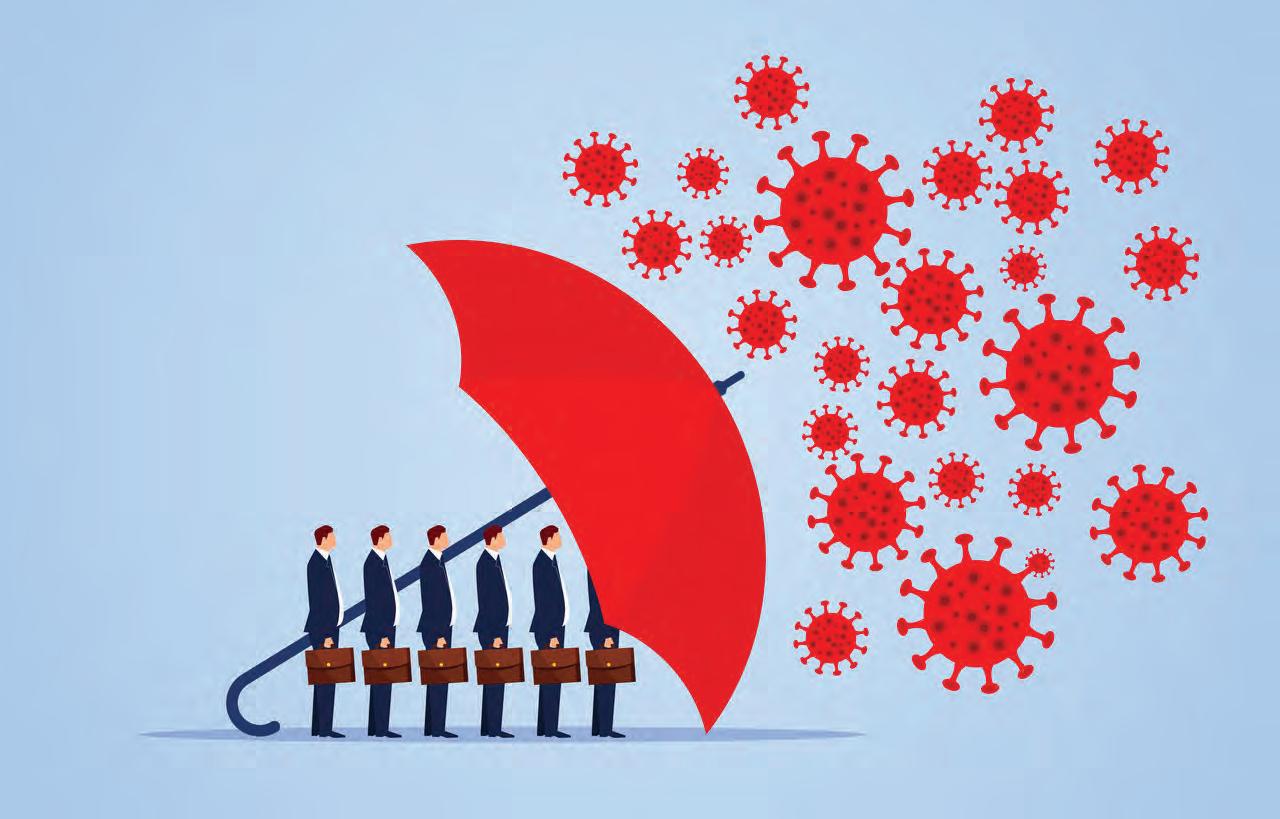B Y
P A T R I C K
H I G G I N S
Putting out an album in the middle of a pandemic likely can’t help but feel a bit anticlimactic. The many months (or years) of work spent writing, recording, planning, and conceptualizing the marketing and promotion which are involved in an upcoming release usually culminate in a rash of celebratory activity. Live performances, the courting of radio to spin the carefully chosen singles or an on-air appearance, seeing physical copies on shelves in stores, and even interviews with challenged but no less dogged and unwaveringly determined local alternative weekly publications (a’hem) ––
HearSay Livin’ la Video Local The in-person live music experience isn’t going anywhere. Don’t worry. The only thing about it that’s going to change moving forward is its shape, from bigger to smaller. The extent of the decrease will depend on the square footage of the venue. For forward-thinking music spaces, square footage can become an afterthought thanks to livestreaming. “I think people are getting used to the idea of live and virtual streaming,” a furloughed Paradigm agent recently told Rolling Stone. “Right now, the idea of going to a 300-cap venue and pushing through some asshole crowd of kids to pay for an $18 beer, just to stand in a corner and nod my head to some music that is never as good as the record, seems just like hell to me. Maybe I’m the only one. Maybe I’m jaded, but I don’t think live music will be as important as it once was for a while.” He’s probably just jaded. The in-person experience is always going to be important, the degree to which varying by shades in cycles like every other artistic medium. Now that in-person’s luster may be waning a little due to social distancing and the bright, shiny, intoxicating newness of livestreaming, venue owners all over the world are getting creative. Leading the way locally during the lockdown has been MASS, offering its Social Distancing Concert Series.
Brandin Lea, The Unlikely Candidates, and the Quaker City Night Hawks’ Sam Anderson are just some of the big timers whose performances have been livestreamed from the Near Southside venue’s stage. Is livestreaming a legit option moving forward? “I believe livestreaming will be/has become a viable medium for musicians,” said MASS co-owner Ryan Higgs in a text message. “However, the main source of income for artists is touring. The venues/ bars need the bodies to sell booze and to stay open. The bands need that in-person energy that only comes from being there. The trick as a venue is to find if both streaming and live shows can exist together. I’m not forgetting people who have reasons to stay home during this pandemic and even after restrictions are lifted. The chance to see live music will hopefully be available.” Lola’s Saloon owner Brian Forella believes livestreaming is “totally legit,” he told me. What he may like most about it is that it brings together his two worlds: his Fort Worth family and his extended family in Florida and New Jersey. For performances by two Lola’s bartenders, Blake Parish and Kris Luther, Forella pitches them especially hard to his out-of-town kin: “Now I can just go, ‘Wednesday at 10, Blake and Luther are on Facebook Live. ... You guys aren’t in town, but they’re my buddies.’ [My family] couldn’t see them play before. Now they can. ... They can drop them 20, 30, 50 bucks: ‘That’s badass. Here’s 50 bucks.’ ” Owner of the TCU-area venue The
Moon, Chris Maunder isn’t quite sure if livestreaming is here to stay but definitely spies an opportunity: “Um, I don’t know about the definition of ‘legit,’ but I always felt like this was something coming, and I’m really interested to see how it progresses.” Maunder believes that livestreaming is especially advantageous to touring and/ or major-label artists: “It’s a really good outlet for fans of bands with a wide-ranging fan base. They don’t always come to town, and you can’t always see them, so for those bands, it’s a really good option. On the local, smaller side, I just don’t know.” About the big artists, he’s right. Livestreaming services such as StageIT and LiveXLive are reportedly fielding more inquiries now than ever. LiveXLive has created its own content, a departure from livestreaming only major festivals such as Electric Daisy and Lollapalooza. The company expects to air at least 75 episodes of My Home to Yours over the next year, up from 40 the year before, the CEO told Rolling Stone. “Livestreaming is just exploding,” he said. “We’re beefing up our production team.” Forella is beefing up his, too. Working with audiovisual producer/engineer/ musician Nick Choate, Lola’s owner imagines ticketing to be as simple as perhaps posting an image of your purchase or paying to be part of a special group specific to the livestreaming platform, like Facebook. “Maybe pay 20 bucks at the door, and when it’s sold out, it’s sold out,” Forella said. “Just do a small show inside,” he continued,
differentiating between Lola’s Saloon and the much more spacious adjacent space, Lola’s Trailer Park, “because the days of 150 people inside Lola’s [Saloon] are not coming back anytime soon.” Maunder is prepared to embrace livestreaming, too, though cautiously. He said that he has watched it go locally from super-successful to routine in just a few short weeks, which gives him pause: “My guess is that it has to do with the repetition, how often the smaller, local bands are playing. The same issue that we have of bands playing live all the time [locally] is what we’re having online now. Now, if it’s something very special, I can see a bigger group of people watching. I’m definitely excited about that direction, and for small clubs, it’s always good to have an outlet like that. Whether we’re charging or it’s a livestream, it’s a good opportunity.” The music industry at large appears to be weakening. Touring revenue seems to be the only avenue by which most artists earn any real income — revenue from product sales is next to negligible, and the payout from streaming services such as Spotify and Pandora is minuscule for most. Livestreaming may be the way to move forward, especially locally. “Streaming is a viable way to get through the next frickin’ year,” Forella said. “Everyone’s going to have to adapt. You gotta move and shake, or it’s not going to happen.” Contact HearSay at hearsay@fwweekly.com.
fwweekly.com
The Nashville-based Fort Worth native releases Levee, her Americana debut full-length.
friend reminded her of a line from one of her favorite songs. In the outlaw country classic “Highwayman” by the legendary country supergroup The Highwaymen, Waylon Jennings describes a place “where steel and water did collide.” With a “levee” being just such a place, Darien found her theme. As well as Cooper’s fingerprints all over the album, Darien enlisted singer-songwriter Owen Beverly to perform the duet on “The Sparrow & the Sea,” and former Arlington native Maren Morris receives co-writer credits for “Twisted Metal” and the Tom Waits-ian “Low Road.” Perhaps the most surprising co-writer credit goes to Darien’s father, who penned the opening verse to one of the album’s singles, “American Steel.” Though primarily a welder and a mechanic, her father, she said, has always been creative with language and often writes poetry. She said that the experience of writing with her father is a memory she cherishes and is a particularly poignant example of the inspirations behind the album. “I think it’s very special to have a song that I wrote with my dad,” she said. “Especially [because it’s] about things that last –– about things that survive long after we’re gone. This song will still be here long after we’re gone.” It’s a sentiment that is not lost during these times, that no matter what is happening in the world, some things still have structure, are necessary, and survive. l
M AY 6 - 1 2 , 2 0 2 0
Van Darien
The album, recorded over several months at Nashville’s Glass Onion Studios, is made up of 10 tonally diverse story songs that blend folk, country, and even indierock flavors. Darien gives credit to her producer/guitarist (and boyfriend of nearly eight years), Steven Cooper, for the way he helped craft and accentuate the tracks emotionally. She puts particular emphasis on his creativity for the broad spectrum of sounds that appear on Levee, like what she calls the “dying dinosaurs” solo on “Twisted Metal” –– sounds that are fairly foreign in most “Americana” music. “He definitely had all of the say sonically, as far as the direction a song would take,” she said. “When I bring a song to the table, he’s very good about bringing out the emotion [the song is trying to relate]. For example, on ‘The Sparrow & The Sea,’ that’s a very emotional and dramatic song. But every time that solo comes around, somehow it magnifies those emotions even more than I could ever do vocally or lyrically.” The title of the album is an allusion to Darien’s tendency to consistently reference images of water and metal in her lyrics. With songs like the title track, “American Steel,” and the aforementioned “Twisted Metal” and “The Sparrow & the Sea,” Darien finds herself subconsciously returning to these two seemingly disparate concepts again and again. The actual marrying of those two ideas into a single theme solidified when a
FO R T WO R T H W E E K LY
MUSIC
these represent the flurry of momentum that typically surrounds an artist after the release of new music. Though she knew almost all of the payoff for all the work leading up would be denied, singer-songwriter Van Darien decided she still needed to do it. It is “definitely strange to say the least –– I really had to think about it for a while,” Darien said of releasing an album while the world is in lockdown. “It’s kind of a selfish feeling because you’re asking people to pay attention to you while people’s lives are at stake. It’s a very conflicting feeling, but after talking to a bunch of people about it, they were like, ‘No, we need the music. We need the distraction. We need something to brighten our day.’ Even though it is a little bit of a somber record, there are things that are very happy about it –– things that take you to another world. I think it’s important to have that right now.” Devoid of the usual pomp, on April 10, Darien released Levee, her first full-length effort. It joins a now-unavailable album she put out in 2009 and a prior EP (2014’s Silent Sparrow), but she counts Levee as her proper debut. It also represents her first new music since relocating to Nashville from Fort Worth five years ago. Darien said she feels the material on Levee demonstrates her development as an artist, highlighting what she describes as “much more of the writer side of me and [which] tells my story better” than her previous efforts.
17






